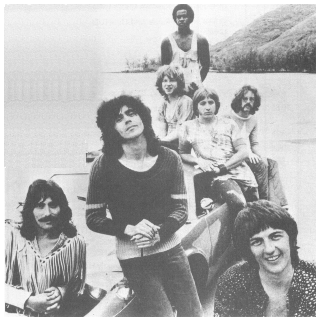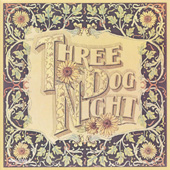|
"Black and White" Three Dog Night Dunhill 4317 September 1972 Billboard: #1
In the late '50s, Sammy Davis Jr. recorded "Black and White," backed by another classic Robinson composition, "The House I Live In," for a limited edition EP issued by the Anti-Defamation League of B'nai B'rith. But the song did not receive a commercial release until the Jamaican group Greyhound cut a reggae version in 1971. While on a European concert tour, members of Three Dog Night heard Greyhound's single on a Dutch radio station. "When I eventually met Three Dog Night," says Robinson, "they told me, 'We knew this was going to be a hit immediately.' Of course, both they and (Greyhound) changed the style from the way we originally wrote it. They made it like an 'A-A-B-A-B-A' song," he explains, "whereas we write it as five verses with quite a bit more content. To give you an idea, the second verse of our version runs, 'Their robes were black/Their heads were white/The schoolhouse doors were closed so tight/Nine judges all set down their names/To end the years and years of shame.' "They condensed the most communicable parts of it into a single song number," continues Robinson. "You might call it a more unified whole, although Dave and I liked our arrangement better than theirs. But of course, we were delighted that they did it," he chuckles, "because the Robinson family ate for a year afterwards." "I got called by CBS in the late '50s or early '60s," Robinson says, remembering another special use for "Black and White." "I was on CBS often in the early '40s, but it had been a long time since they called me. You see, I had gone through the blacklist (in the McCarthy era). At any rate, now they wanted to clear a song of mine that they called 'The Ink is Black.' "And what were they doing with it? Well, it was to be part of a film about an American sort of Peace Corps in French Guinea helping the locals build a recreation hall. They were using this song to teach them how to speak English. And it appeared in the film several times with a blackboard and a pointer. And it went, 'The ink is black/The page is white...'". Three Dog Night's "Black and White" entered the Hot 100 at number 61 on August 12, 1972, and made a swift ascension: 61-47-23-14-9 to number one. The group had two more Top 10 hits, "Shambala" (number three in July 1973) and Leo Sayer's "The Show Must Go On" (number four in May, 1974). Their 21st and final chart entry was "'Til the World Ends," number 32 in August, 1975. - Fred Bronson, The Billboard Book of Number One Hits, Billboard, 1988.
No comments so far, be the first to comment. |


